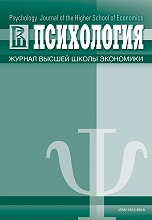Sex Differences in the Big Five of Personality: Looking through the Attitudes toward Traits
Abstract
Gender differences in personality traits according to the “Big Five” model are reproduced consistently in various studies on different cultures. The reasons for these differences are usually explained in biological and social deterministic theories. The reflective component of personality traits also can serve as their explanation. For example, earlier (Shchebetenko, 2017) it was shown that gender differences in traits can be explained by reflective characteristic adaptations (RCA) – element of personality, which pertains to awareness and monitoring of one’s individual traits. This effect was stable for all traits except for neuroticism. In the present paper we studied to what extent this configuration of results is non-random and empirically reproducible. Nine hundred six people aged 17-25 took part in the study, 314 (34.7%) were male. Gender differences were found in agreeableness, neuroticism, and openness: all these traits were higher in women. The hierarchical regression analysis showed that men and women differed in an RCA, namely, in attitudes toward traits, which statistically eliminated gender differences in traits themselves. Such a result questions biological deterministic theories of gender differences in traits. Social strategies of conduct and upbringing of sexes can affect differential evaluation of traits by men and women. Neuroticism is the exception again: as in the previous research, gender differences in this trait were still salient even after controlling for attitude toward it. Probably, behavior of men and women is differed in the degree of manifestation of neuroticism, and these differences are not determined by the reflective appraisals of this trait.
Downloads
References
2. Bleidorn, W., Kandler, C., Riemann, R., Spinath, F. M., & Angleitner, A. (2009). Patterns and sources of adult personality development: growth curve analyses of the NEO PI-R scales in a longitudinal twin study. Journal of Personality and Social Psychology, 97, 142-155. https://doi.org/10.1037/a0015434
3. Costa, P., Jr., Terracciano, A., & McCrae, R. R. (2001). Gender differences in personality traits across cultures: Robust and surprising findings. Journal of Personality and Social Psychology, 81, 322-331. https://doi.org/10.1037/0022-3514.81.2.322
4. De Bolle, M., De Fruyt, F., McCrae, R. R., Lockenhoff, C. E., Costa, P. T., Aguilar-Vafaie, M. E Terracciano, A. (2015). The emergence of sex differences in personality traits in early adolescence: A cross-sectional, cross-cultural study. Journal of Personality and Social Psychology, 108, 171-185. https://doi.org/10.1037/a0038497
5. Guimond, S., Branscombe, N. R., Brunot, S., Buunk, A. P., Chatard, A., Desert, M Yzerbyt, V. (2007). Culture, gender, and the self: Variations and impact of social comparison processes. Journal of Personality and Social Psychology, 92, 1118-1134. https://doi.org/10.1037/0022-3514.92.6.1118
6. Horsburgh, V. A., Schermer, J. A., Veselka, L., & Vernon, P. A. (2009). A behavioural genetic study of mental toughness and personality. Personality and Individual Differences, 46, 100-105. https://doi.org/10.1016/j.paid.2008.09.009
7. John, O. P., Naumann, L. P., & Soto, C. J. (2008). Paradigm shift to the integrative Big Five trait taxonomy: History, measurement, and conceptual issues. In O. P. John, R. W. Robins, & L. A. Pervin (Eds.), Handbook of personality: Theory and research (pp. 114-158). New York: Guilford Press.
8. Malykh, S. B., Voronin, I. A., Ismatullina, V. I., Zakharov, I. M., & Tikhomirova, T. N. (2014). Sex differences in the relationship of «Big Five» personality traits and intelligence. Teoreticheskaya i Eksperimentalnaya Psikhologiya [Theoretical and Experimental Psychology], 7(4), 17-25. (in Russia).
9. McCrae, R. R., & Costa, P. T., Jr. (2013). Introduction to the empirical and theoretical status of the five-factor model of personality traits. In T. A. Widiger & P. T. Costa (Eds.), Personality disorders and the five-factor model of personality (3rd ed., pp. 15-27). Washington, DC: American Psychological Association.
10. Open Science Collaboration. (2015). Estimating the reproducibility of psychological science. Science, 349(6251), aac4716. https://doi.org/10.1126/science.aac4716
11. Schmitt, D. P., Realo, A., Voracek, M., & Allik, J. (2008). Why can't a man be more like a woman? Sex differences in Big Five personality traits across 55 cultures. Journal of Personality and Social Psychology, 94, 168-182. https://doi.org/10.1037/0022-3514.94.1.168
12. Shchebetenko, S. (2014). "The best man in the world": Attitudes toward personality traits. Psychology. Journal of the Higher School of Economics, 11(3), 129-148
13. Shchebetenko, S. A. (2015). Reflexive characteristic adaptations within the five-factor theory of personality framework. Psikhologicheskii Zhurnal, 36(6), 55-65. (in Russian)
14. Shchebetenko, S. A. (2016). Online social network users' attitudes toward personality traits predict behaviour of their friends. National PsychologicalJournal, 4, 34-44. https://doi.org/10.11621/npj.2016.0404
15. Shchebetenko, S. (2016). Reflexive characteristic adaptations within the five-factor theory: Between basic tendencies and external outcomes. Personality and Individual Differences, 101, 35-41. https://doi.org/10.1016/j.paid.2016.05.055
16. Shchebetenko, S. (2017). Reflexive characteristic adaptations explain sex differences in the Big Five: But not in neuroticism. Personality and Individual Differences, 111, 153-156. https://doi.org/10.1016/j.paid.2017.02.013
17. Shchebetenko, S., & Tutikova, E. (2015). "The picture is good because openness to experience is good": The mediating role of attitudes toward personality traits in individual differences in painting preferences. Psychology. Journal of Higher School of Economics, 12(4), 122-141 (in Russian)





